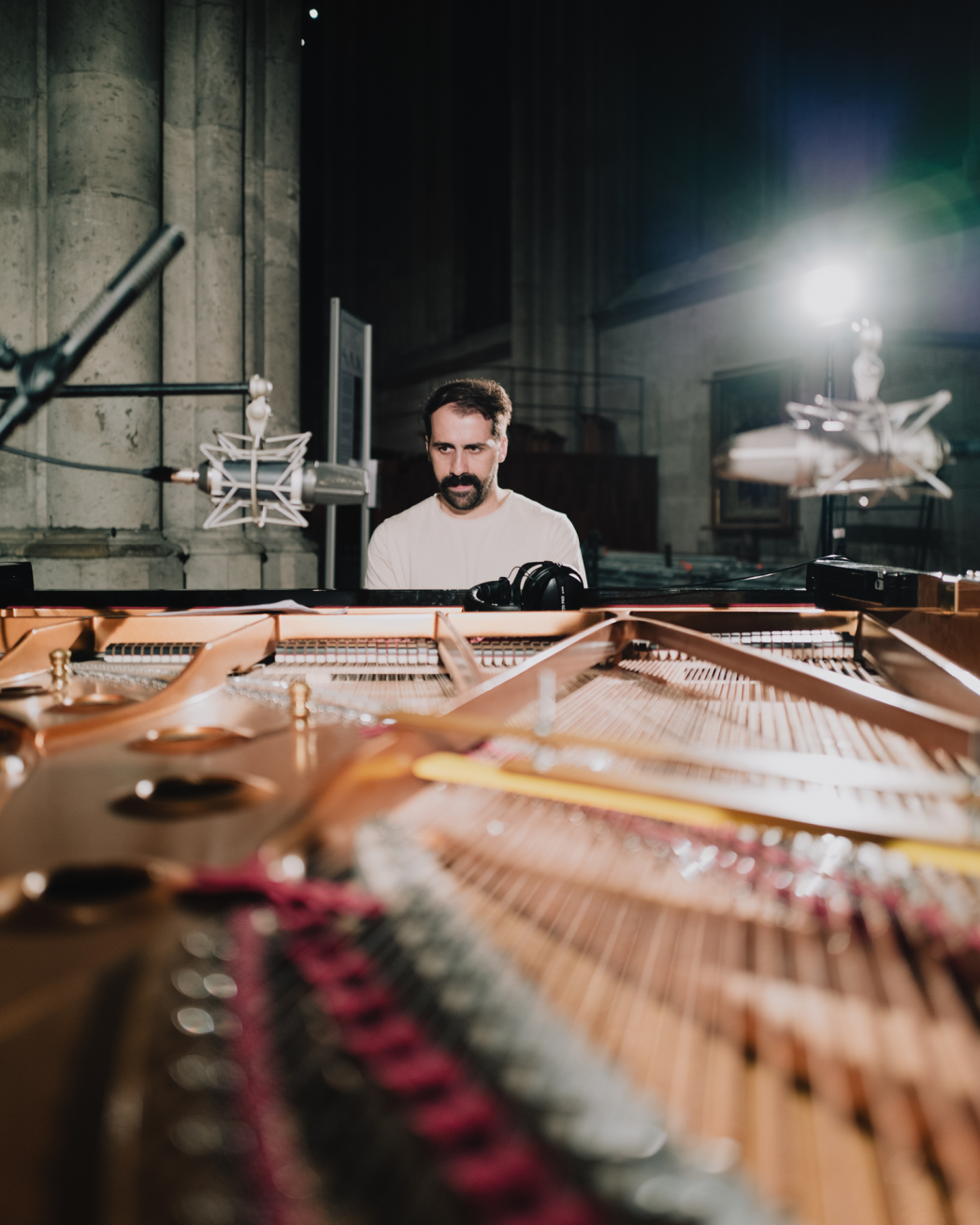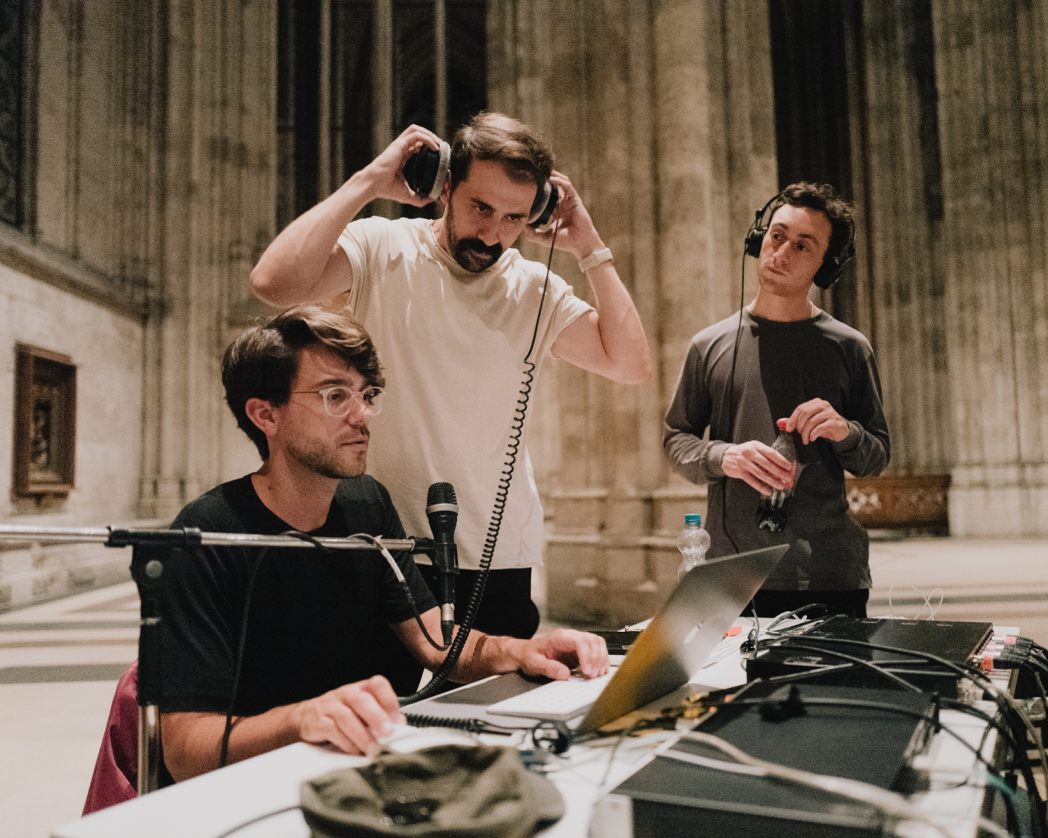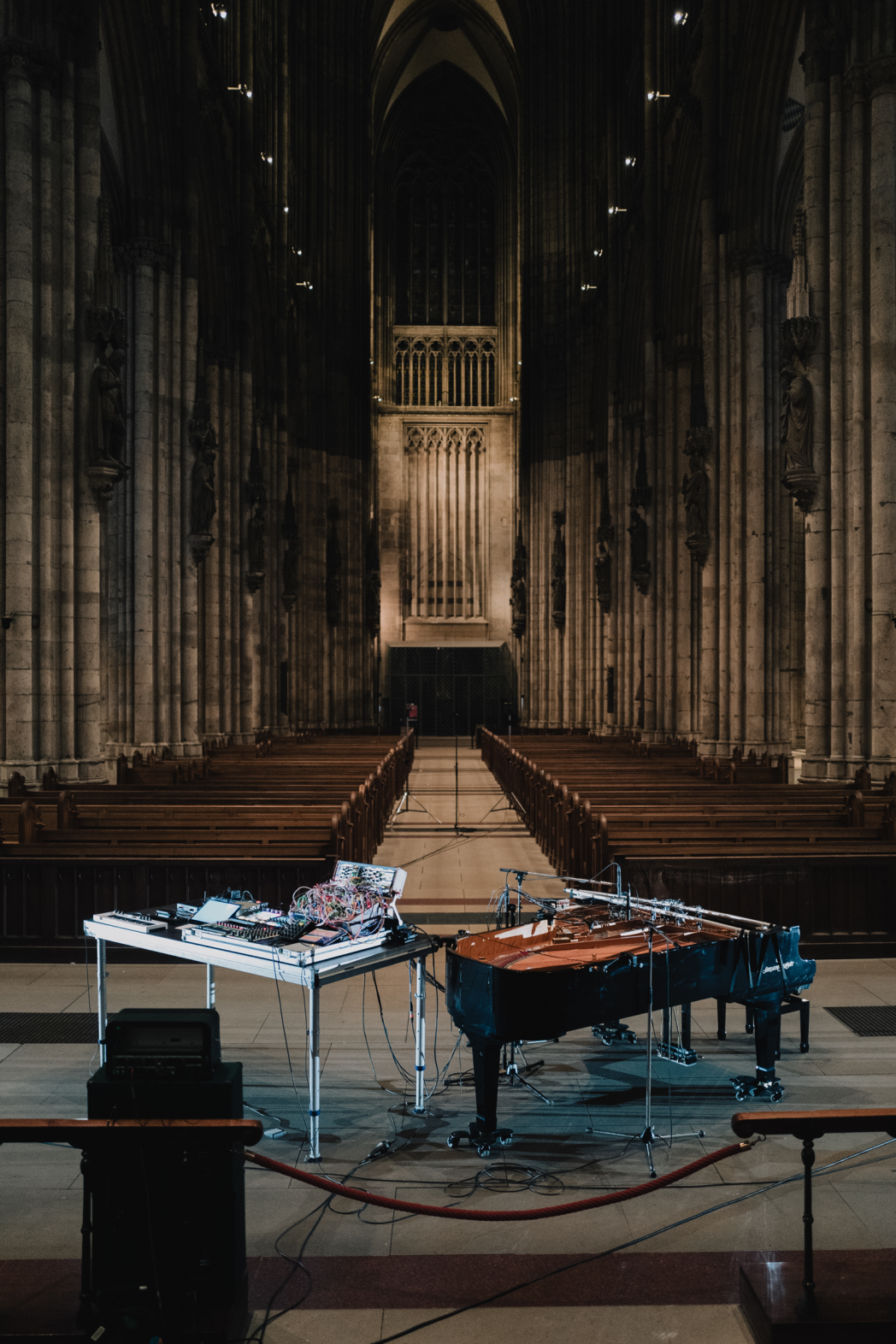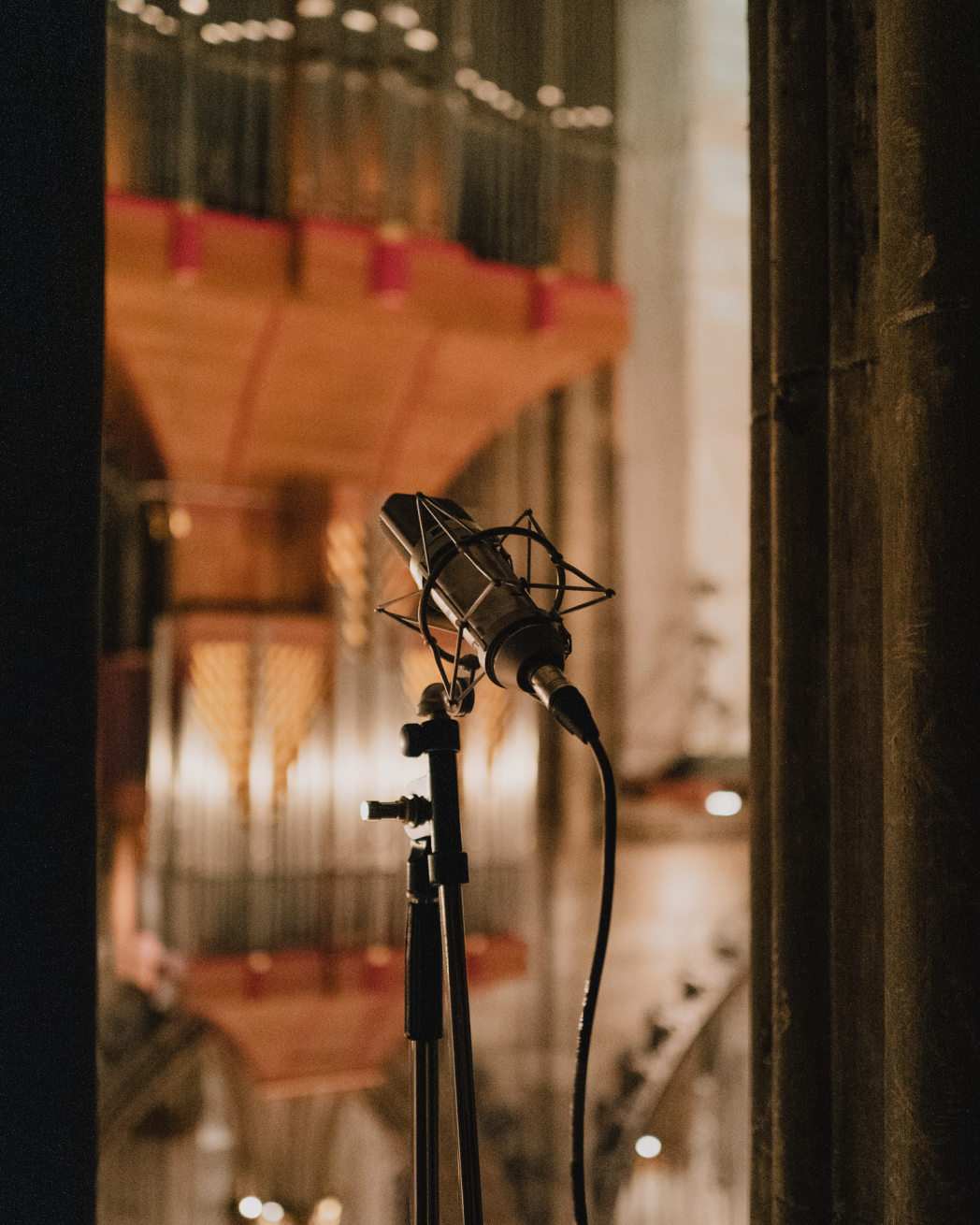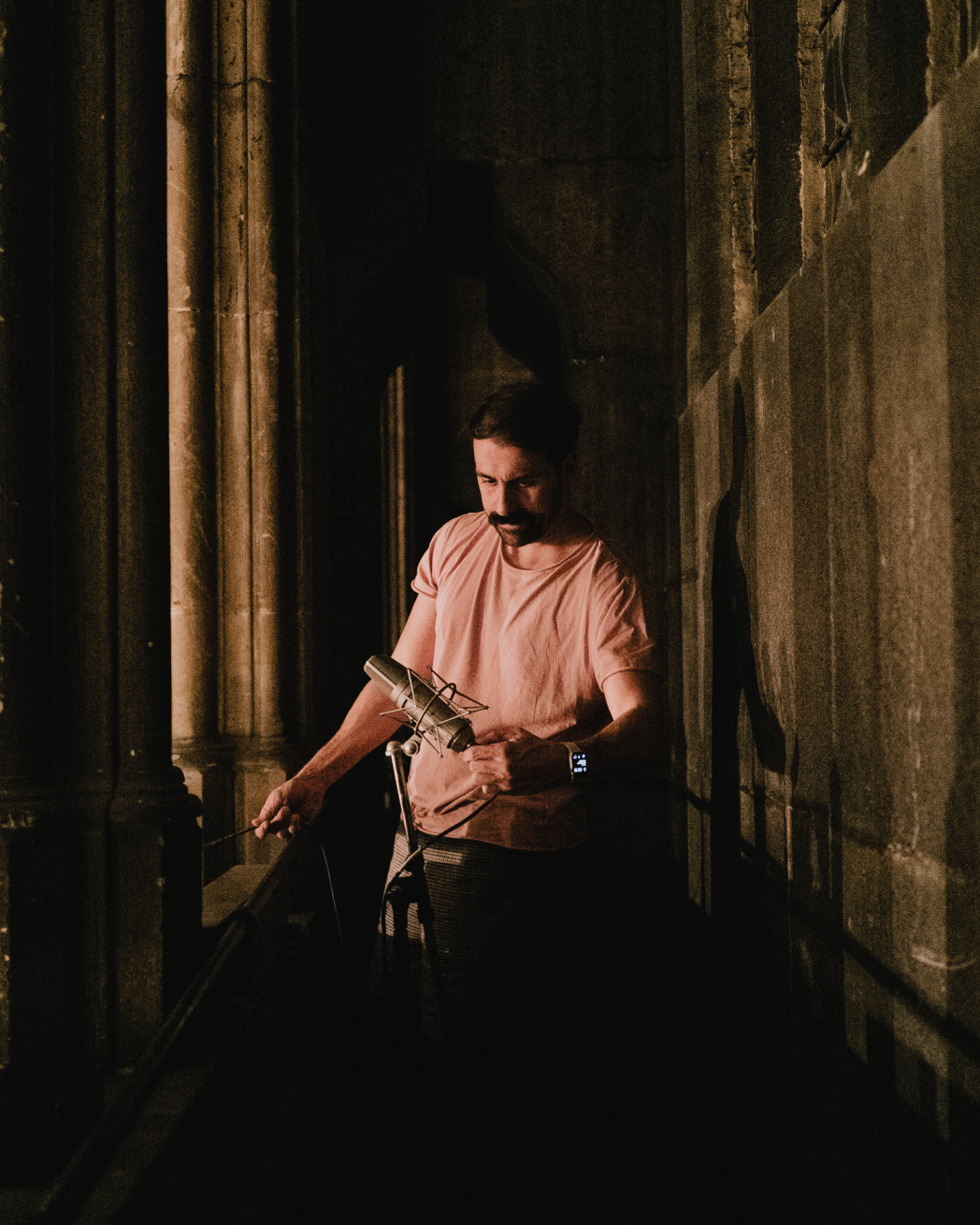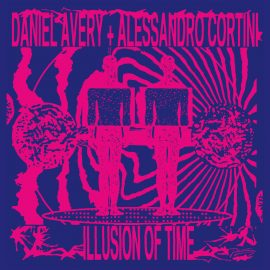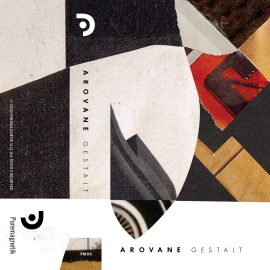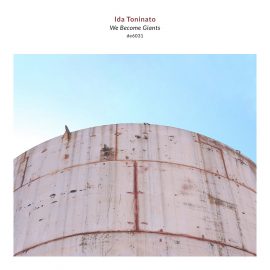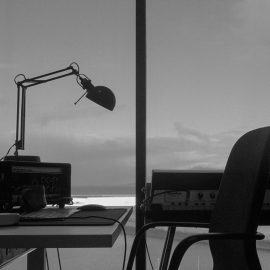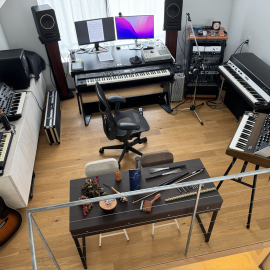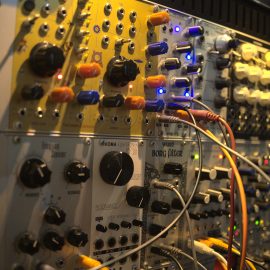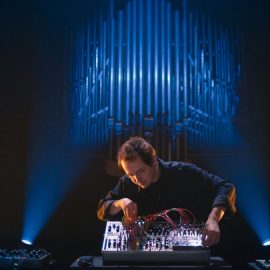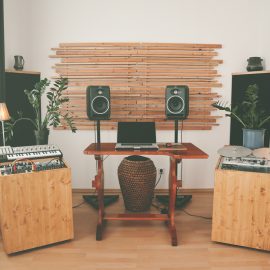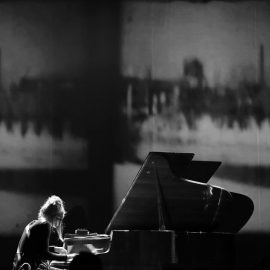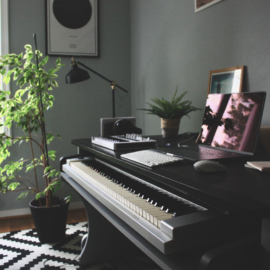Editor’s Note: This feature requires a bit of background first. In 2019, German-Turkish pianist Erol Sarp and Swiss engineer/software designer Lukas Vogel were approached by Peter Füssenich, master builder and architect of the Cologne Cathedral, about performing a concert at the iconic location. It finally happened in 2022 as part of a celebration honouring the 700-year anniversary of the consecration of the eastern (and oldest) part of the church, where they performed on the nave. The piece was specifically composed for the venue, which acted as the studio in which the album, Late Reflections, was recorded. All answers below are furnished by Erol Sarp.
Let’s start at the very beginning. Can you tell us how you got involved in composing, and what was your very first piece of gear?
My parents made me take piano lessons when I was about six years old. And I always felt (but couldn’t express back then) that I never really bonded with the classical approach with all those rules and the strictness. After around six or seven more years, I finally quit and ended in a kind of love/hate relationship with the piano. I still wanted to be able to play, but I needed some time away from the instrument. At 15, I got into Heavy Metal and started to play the guitar and drums, and that would also be the time when I first learned that you could change the nature of the sound of an instrument by using gear. The first thing that I bought from my teenage savings was a very crappy reverb pedal I got on eBay. I didn’t know what I was buying there, but I read that “you need pedals”. So I got one. I thought that I would sound like Metallica or Slayer, but all it did was add some reverb (surprise!) to the very thing sound of my guitar. Took some time to realize that what I was looking for was a Distortion pedal. However, I returned back to the piano in my late teenage years and discovered jazz with all its freedom, and from there I learned about contemporary music, especially minimal music and then electronic music, and by going through all these different genres, I developed my musical vocabulary that I still try to expand.
How many different studio iterations have you gone through, and what does your final setup look like right now?
When we started, we set ourselves the restriction that we could only use the grand piano as a sound source. So no other instruments were allowed. And we still stick with that rule. In general, the main setup has been almost the same from the beginning. We have this self-built apparatus that consists of small electromagnetic hammers that can hit various parts of the grand piano and so-called bows that can make the strings resonate and generate an almost organ-like sound. In addition to that, we work with live sampling, meaning that all the sounds we get from the piano can be manipulated in various ways (reverb, delay, distortion, granular stuff…). What has changed is that we went away from the approach that everything had to be played live and started to get more and more into producing and spent a lot of money on gear. Software and hardware-wise, there is constant growth which helped us a lot to develop our sound.
Tell us about your favourite piece of hardware.
Right now, I’m very much into grainy and granular pedals. The last one I bought was Walrus Audio’s FABLE, and so far, I’m loving it. It helps a lot to create blurred and hazy soundscapes. My favourite one right now would still be the Microcosm by Hologram Electronics.
And what about the software that you use for production?
Our mothership is Ableton Live. And Lukas does a lot of stuff with Max/MSP and programs his own effects and patches. In addition to that, we have lots of Waves Plugins, the Sound Toys Suite and individual VSTs that we stumble upon when digging for effects or browsing through blogs and magazines. Or Insta reels.
Is there a particular piece of gear that you’re just dying to get your hands on, and do you think one day you’ll have it?
Maybe this is a bit weird as we have the strict rule that we only can use the grand piano as a sound source, but right now, I’m constantly looking for a Fender Jazzmaster, preferably from the 80s. Which doesn’t cost a fortune… And a Roland Jupiter 8 would be really nice someday.
Can you please share some aspects of sound design in your work?
All these effects that we have (and will buy in the future) are opening up new possibilities for us to transform the sound of a grand piano. To a point where you can’t tell that the original sound or sample was taken from a grand piano once. This makes it really fun to come up with new ideas and play with the perception of the listener. Maybe I should also mention that Lukas has developed a kind of addiction to modular/Euro Rack stuff, which does crazy things and is super inspiring. A few years ago, we also started to engage in film scoring, where all these elements can be placed very effectively when for instance, you want to underline a certain action or sentiment of a scene. Also, on the previous album, we started to work with synth-like lead sounds or heavy percussion or pads. Again, everything is originally coming from the piano, but time after time, we came up with our trademark sound.
Any particular new techniques that you tried out for your new album?
For the first time, we had a real concept: writing music for the Cologne Cathedral – a very (!) large room which we composed the music for. While composing the music, we always had that in mind. For example, faster tempos with four-to-the-floor bass drums wouldn’t work that well. Also, fast chord changes would be difficult. Before we started writing, we took an impulse response from the room and always tried out how everything would sound if we put it through it. A lot of things can become too washy and dense, so we had to dial back here and there. That put a really big restriction on the whole project, but it also helped a lot.
What does your live setup look like, and what do you bring with you when you travel for an extensive tour?
When you look at the stage, you’ll see a grand piano that is connected to a standing large table with a lot of wires. On that table, we have a flight case that contains a Mac Studio, a Pioneer Toraiz drum machine, two Faderfox MIDI controllers, a smaller Euro Rack system with a few modular effects and, besides some more controllers and two stage boxes, a strange-looking “block” that connects the computer to the electro-magnetic hammers that are placed on two aluminium bars on top of the piano. Everything is looking a bit chaotic, and there are too many elements that we would able to arrange tidily. One article once compared it to “open-heart surgery on a grand piano”, and that sums it up quite nicely. On the road, we put all those things into two big cases that barely fit the rules of what you can bring on an aeroplane. And when it’s a real tour with ongoing dates, we started to bring our own grand piano, which is really cool as we, and especially our sound guys, know how to treat the instrument. And more and more cases with lights…
What is the most important environmental aspect of your current workspace, and what would be a particular element that you would improve on?
The biggest task right now is to find a new studio room for me in Berlin. We live in separate cities (Lukas lives in Zurich), and to be a bit more independent when we have to record piano parts, it would be really good to have that room here in Berlin so that I don’t always have to go to Zurich for that. But apart from that we are really happy about the current situation. We have found a way to work from two different places and can collect ideas or work on scores first before adding final touches to them when we’re in our studio in Zurich together.
What can you tell us about your overall process of composition? How are the ideas born, where do they mature, and when do they finally see the light?
Basically, a lot of ideas come from improvising with the instrument or with our gear. Of course, there is always something emotional, sometimes almost sentimental about our music, but all that isn’t really a thing that we strive for. We just star, ideally without having thought about it too much, and then we send it to each other, and everyone can add or take away something, and after a few iterations, we start to put it into an arrangement, and we almost certainly end up at a total of six minutes and then have to look if it really needs to be that long.
After the piece is complete, how do you audition the results? What are your reactions to hearing your music in a different context, setting, or a sound system?
We didn’t really do it in the earlier years, but now we are listening to those rough ideas in different situations. In the car, on the train with headphones, really loud in the studio, through our kitchen or bathroom speakers and we if there are particular elements or frequencies that stand out or need some boosting. This sort of analysis really helps to get a better understanding of the whole mood of a song. Also, if the arrangement is good or bad. Of course, it never sounds the same, but it should never sound annoying or, for example, too aggressive on any kind of speaker.
Do you ever procrastinate? If so, what do you usually find yourself doing during those times?
Yes! It’s easy to get lost in audio-oriented reels (although I would count that as research). I also got my hands on a Playstation 5, which is also very, very tempting. Watching series. Fooling around with ChatGPT. Reading. Cleaning even though there is no need for it (to be honest, there always is). Playing darts. Looking up cooking recipes. Watching the top 10 goals of Premier League season 2012. I do all that kinds of things when I’m in the middle of working on something. Re-reading that, it feels that I can’t really concentrate. But I can! Really!
What gets you inspired?
What I kind of regret is that I haven’t really taken time in the last months to listen actively to other music. The possibilities are so amazing these days. Sometimes the best thing is to take a whole evening or night and just click through the millions of songs and recordings and videos and get lost in that.
And finally, what are your thoughts on the state of “electronic music” today?
When you feel we might finally have reached the peak and there’s nothing new to expect, there are always guys who come up with something new and innovative. Some things that have had a very strong impact on me recently were the rendition of Steve Reich’s Music For 18 Musicians by Erik Hall, people like Hainbach or BlankFor.ms, or Moderat’s live session at Grand Palais.
